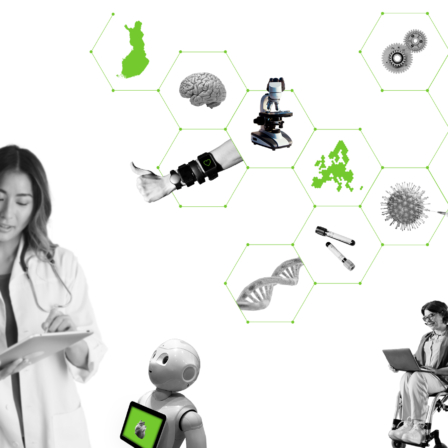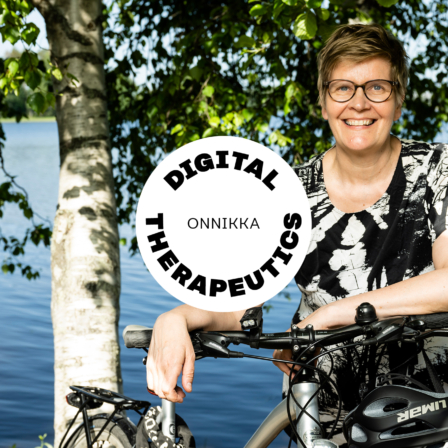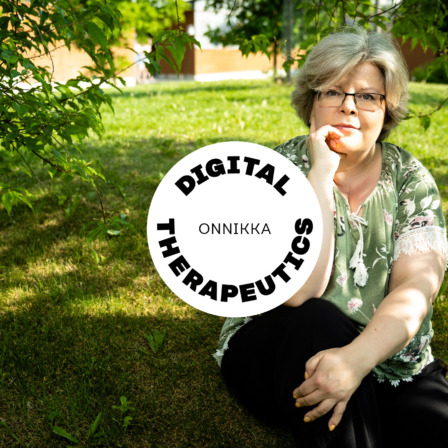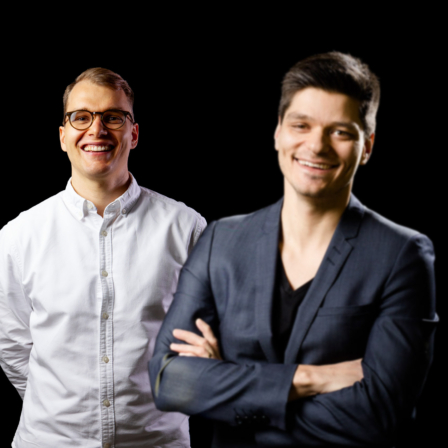Pilot projects: Digital therapeutic experiments
Health apps are already being used as part of medical treatment in several countries. Producers and organisers of health services experimented with using digital therapeutics as part of practical care. The projects were completed in May 2023.
Latest
What is it about?
Digital health applications are already being used in several countries as part of medical treatment. They are being used in treating, managing and preventing diseases.
Digital therapeutics refer to medical evidence-based digital care methods, used to treat or prevent diseases. They are offered directly to patients to support their treatment and rehabilitation and patients play an active role in their use. The methods must be proven to be safe and medically effective.
Digital therapeutics can be stand-alone treatments for conditions such as depression, or they can be used in combination with medical treatment, such as for cancer. Digital therapeutics are not conventional well-being applications, but are clinically proven care methods intended for the treatment of a specific disease or syndrome. For more information, see the website of the Digital Therapeutics Alliance (PDF).
Sitra funded projects in which the producers and organisers of health services experimented with the practical use of digital therapeutics. The aim was to find new digital therapeutics to use in everyday healthcare.
The experiences and lessons learned from the pilots can be used widely in Finland when introducing digital therapeutics.
What did we expect from the pilot projects?
- The project should focus on the treatment, management or prevention of a specific disease, syndrome or set of diseases.
- The digital therapeutic must constitute a treatment or prevention of a specific disease.
- The project will gather experiences from professionals and users.
- The project must end by 31 May 2023.
- The results of the project will be reported to Sitra, which will use the results in its own work and communications.
Results
There were six projects, focused on various diseases or syndromes.
Weight management self-care in primary healthcare
Obesity is one of the major health problems worldwide. The pilot project offered patients digital therapy proven to assist weight management. The aim was to reduce overweight and the effects of weight reduction on cholesterol and blood sugar, for example.
The Onnikka app was tested for weight management in the wellbeing services county of Central Finland. The pilot showed that the app made it possible to treat patients with fewer staff resources than usual. Nurses liked the fact that the app did not require separate data entry, and the workload per patient was kept low. Professionals found the application to be easy to use.
After six months of follow-up, the average weight loss was 4%. The benefits of the app were particularly evident among patients of working age who were basically healthy and were not massively overweight. It was not possible to demonstrate direct effects on blood glucose and cholesterol levels during the pilot, but weight loss can be expected to have had an effect on these values too. Patients felt that the app supported their weight management, and gave them new weight management tools and useful information. On the other hand, weight loss requires effort that cannot be avoided by using the app. About 150 patients took part in the pilot.
Further use of the app will be considered in the wellbeing services county.
Project implemented by: Hospital District of Central Finland, Jari Porrasmaa
Digital therapy: Onnikka
Better functional capacity for multiple sclerosis (MS) patients
Fatigue is a common symptom affecting the functional capacity and quality of life of MS patients. The pilot project studied the use of digital therapy for the self-management of fatigue among MS patients. The digital therapy is based on activity planning, where patients use a mobile application to learn to assess the factors that affect their coping and thus better deal with their symptoms. The aim was to strengthen patients’ experience of managing their own coping, facilitate communication between patients and healthcare professionals and optimise the overall treatment of multiple sclerosis.
The pilot tested More Stamina, an app under development for the self-management of fatigue in MS patients. The pilot had a strong research aspect and was carried out in collaboration with the University of Oulu and Oulu University Hospital. The app appeared to benefit the participants, with as many as 95% of them continuing to use it to the end of the trial. Some 20 patients participated in the pilot.
More detailed data on the app’s effectiveness will be obtained in autumn 2023 and t further development is planned.
Project implemented by: Oulu University Hospital, Mervi Ryytty
Digital therapy: More Stamina
Digital treatment of cancer patients throughout the service system
Cancer treatment is often very expensive. Better targeting of treatment can lead to significant cost savings. This pilot project will introduce a digital therapy to guide and advise patients and healthcare professionals throughout the treatment path (including surgery, pharmaceutical and radiotherapy, follow-up and symptomatic treatment). At the same time, the aim was to create a digitally-enabled approach that uses data actively generated by patients to develop a safer and more cost-effective care package. The aim was to improve the effectiveness of care and reduce treatment costs.
The Kaiku Health app was introduced in cancer treatment in Siun Sote. The app makes patients active players and in the treatment of their illness. Patients have been very enthusiastic about the solution. About 60 patients took part in the pilot.
In addition to improving patient satisfaction, the app can save healthcare professionals’ time and enable them move away from ineffective calendar-based monitoring to symptom-based monitoring. The pilot created a model that can be extended to other digital care activities.
Further use of the app will be considered in the wellbeing services county.
Project implemented by: Siun Sote (Joint municipal authority for North Karelia social and health services), Heli Aalto
Digital therapy: Kaiku Health
Improving the treatment balance of patients taking anticoagulants in primary care
The aim of anticoagulant medication (warfarin) is to prevent the normal clotting of a patient’s blood. Finding the appropriate therapeutic balance is often difficult. In the most severe cases, this can lead to stroke or even death. The pilot project concerned the provision of digital therapy to enable more accurate monitoring of blood coagulation. This can reduce patients’ risk of stroke. The aims of the project were to provide better treatment, reduce costs and resource use, and to provide evidence of the suitability of digital therapy and its related delivery model for primary care.
The pilot tested digital therapy approach for managing the use of anticoagulant medication.
The solution made the everyday life easier for patients in particular, but also benefitted the healthcare provider. Patients do not have to travel for measurements, which saves time and money. About 60 patients took part in the pilot.
The time spent by professionals on patients was reduced by a third when the approach was revised to include remote measuring as part of patient care. The app also allows for a decentralised approach, with health personnel working with patients across the whole region. This means that care can continue to flow smoothly, for example during a sudden absence of a single nurse.
A decision on extending the use of solution to the entire wellbeing services county of North Ostrobothnia will be taken in autumn 2023.
Project implemented by: Oulunkaari local authority (in Finnish), Päivi Rekinen
Digital therapy: Orla-DTx INR remote monitoring solution, Tomi Kurppa
Remote rehabilitation of musculoskeletal disorders
Musculoskeletal disorders often involve a fear of movement, inhibiting patients’ functional capacity and quality of life. However, successful rehabilitation depends on self-motivated exercise. The pilot project used digital therapy, which has been shown to significantly reduce fear of movement. The aim of the pilot was to support the management of chronic pain in patients with musculoskeletal disorders and to reduce their fear of mobility, while improving their quality of life and ability to cope with the demands of daily life.
The pilot tested the use of virtual reality therapy for the rehabilitation of musculoskeletal disorders. The identification of different patient groups emerged as an important finding in assessing the effectiveness of the treatment. While some patients benefited significantly from the treatment, others experienced minimal change. Some 20 patients participated in the pilot.
The app will continue to be used and data on its effectiveness will be collected to guide further development.
Project implemented by: Live Foundation, Jori Reijula
Digital therapy: Orion (DTx based on virtual reality technology)
Digital therapy for adult asthma with the Kamu app
Asthma is a common disease that affects about 10 per cent of the population. The clinical presentation and severity of asthma varies due to innate and external factors. The pilot project aimed to identify asthma-specific symptom cycles through the use of electronically measured exhalation values and analytics.
The pilot project collected the experiences of asthma patients and health personnel with the remote monitoring model and explored patient engagement to use a digital app. It also monitored the impact of treatment.
The pilot project tested the digital management of adult asthma using the Kamu Health app. The project found that staff training is particularly important for the introduction of the new treatment model. An adequate knowledge base helps personnel to advise patients who trust professional advice and recommendations. Involving patients in the use of the app is crucial in order to ensure that good quality and up-to-date data is delivered to the care unit through the app.
The app we tested was not yet fully developed. However, patients reported that the app helped them to better identify asthma triggers and symptoms, though it did not seem to have a significant effect on asthma-related anxiety. Around 100 patients took part in the trial.
During the pilot, the company providing the app went into receivership, but the trial was successfully completed.
Project implemented by: Medzilla Oy (in Finnish), Annette Kainu
Digital therapy: Kamu Health














